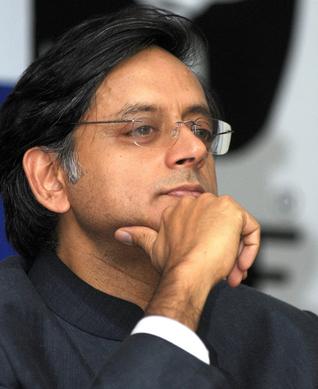 New Delhi, November 5: The university system was not producing "well-educated" graduates to meet needs of Indian companies, giving an opportunity to firms to enter the sector in the "guise" of training, Minister of State for Higher Education Shashi Tharoor on Monday said. He also said that the national education policy in the past has been out of step with the times.
New Delhi, November 5: The university system was not producing "well-educated" graduates to meet needs of Indian companies, giving an opportunity to firms to enter the sector in the "guise" of training, Minister of State for Higher Education Shashi Tharoor on Monday said. He also said that the national education policy in the past has been out of step with the times."The major problem remains that our national education policy in the past has remained out of step with the time. Whereas countries in the Middle-East and China are going out of their way to woo foreign universities to set up campuses in their countries, India turned away many academic suiters who have come calling in recent years," he said.
Speaking at a two-day Higher Education Summit, Tharoor said, "Companies are entering the higher education space in the guise of training. Our University system simply is not producing well educated graduates to meet the needs of Indian companies today."
The HRD Minister said there will be no need for many Indian students to go abroad to study if good higher education institutes were set up in the country. "We will also work towards putting our reform agenda back on track," he said. Tharoor said there is a proposal to establish 50 centres for research in frontier areas of science, design innovation centres, innovation centres in different universities and also research parts of the IITs and other technical institutions. "If finally established, it would transform the research environment in our country," he said.
Tharoor favoured expediting setting up of National Mission for teachers and recommendations of the Narayana Murthy Committee and the Kakodkar Committee besides increasing the spending of 2 per cent on research. The minister said with the ranks of educated unemployed in the country swelling in the absence of adequate employment opportunities, there is possibility of their falling prey to the activities of terrorists and Maoists.
"We must give them a better chance of employment through more and improved educational possibilities. My message is it is time to let a thousand educational flowers bloom," he said. He said even though India with 621 universities and 33,500 colleges has one of the largest network of higher education institutes across the world and second in terms of student enrolment, our gross enrolment ratio of 18.8 per cent in 2011 is still less than the world average of 26 per cent.
He said there was need to develop higher levels of education and skill development and an environment must be created in which not only the economy grows rapidly but also enhances good quality employment. Tharoor said as India aims to grow at 8.2 to 8.5 per cent GDP, the country needs to invest in education and help improve the quality of education.
Referring to a few world-class institutes like IIT's and IIMs and some colleges, the Minister said, "These are still islands in a sea of mediocrity". Citing a UGC survey of 1,471 colleges and 111 universities, he said 73 per cent of the colleges and 68 per cent of the universities are found to be of medium or low quality.
He also said that a FICCI survey has revealed in 2009 that 64 per cent employers are "somewhat satisfied" with the quality of new graduates coming out of engineering institutes. The minister lamented that spending on education is only 1.22 per cent of GDP, against USA's 3.1 per cent or South Korea's 2.4 per cent. He also said that the student-teacher ratio in India was 26:1 against the global average of 15:1. He said the rapid expansion of higher education sector has also led to shortage of faculty.





Comments
Add new comment